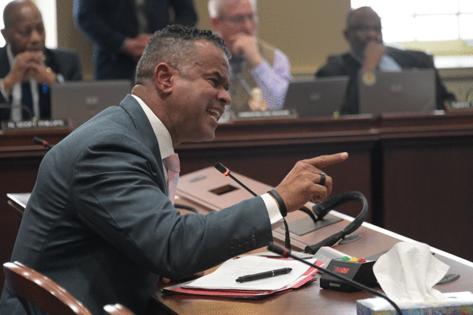Maryland bill seeks to lower cap on Child Victims Act settlements: 'Make sure we don't break the state'
Published in News & Features
BALTIMORE — As claims of child sexual abuse filed against the state continue to mount, Charles County Del. C.T. Wilson is seeking to place a cap on the state’s liability in light of the associated financial burden on the state.
The amended version of House Bill 1378, sponsored by Wilson, a Democratic lawmaker who championed the Child Victims Act in 2023, would put a lower cap — $400,000 — on the maximum potential payout per each claimant who files after Oct. 1. It would also mandate an alternative dispute resolution process to settle claims of child sexual abuse.
“I’ve always said it was never about the money — it was about the truth and justice, restoring the dignity of those who’ve had it stolen from them,” said Wilson, who is also a survivor of child sexual abuse.
The Child Victims Act, which took effect in October 2023, removed the statute of limitations for child sexual abuse survivors to file civil lawsuits against their abusers.
Since then, about 4,500 victims have filed claims, Wilson said, with more pending.
Under the current law, Maryland could potentially be liable for billions of dollars in settlement payments to the survivors of child sexual abuse if each received the current maximum of $890,000 per occurrence of abuse.
Lawmakers were warned of the fiscal implications of the Child Victims Act earlier in the legislative session, though.
At a January fiscal briefing with House and Senate committees, Department of Legislative Services fiscal analyst David Romans told lawmakers that the settlement payments were a “potentially enormous liability for the state.”
The liability the state could face comes as the General Assembly nears the end of resolving Maryland’s $3 billion budget deficit, as well as uncertainty about federal funding under the Trump administration.
“What I’m up here to do is to make sure we don’t break the state, that these people get their opportunity,” Wilson told reporters prior to Wednesday’s bill hearing. “And there will be a financial compensation, but it’s not going to be billions of dollars per individual — my state can’t afford that.”
The bill would also mandate an alternative dispute resolution process to settle claims of child sexual abuse, which Wilson said is needed for accountability and public safety.
“The thing about settlement, and we all see this in the news, is you never know what really happened,” he said. “I want to make sure that each dollar that is paid out is accounted for, that each of those individuals out there are held accountable, live or dead — those names need to be made public.”
Those who were sexually abused as children and attorneys who represent them, however, feel the bill could re-victimize the survivors.
“It’s an insult to say no matter how many times you were abused — some of them were raped a dozen times — and now you’re telling them the most you can get is up to $400,000 and you don’t have your right to have your day in court. It’s just a betrayal to these victims who believed that they were finally going to be heard, that they would finally get some measure of justice,” Ben Crump, a civil rights attorney, said in an interview prior to the hearing.
What happened to Baltimore resident Antoine Harris “epitomizes the reason we’re here today,” Crump said as Harris walked up to him in the House office building.
A staff member raped Harris’ mother while she was in a juvenile detention facility. She was 17; her abuser was 29, Harris said. He was in foster care from 7 months old to age 21.
“It could never be enough,” Harris said of the settlement payments. “But with that, you could add it over time, you don’t have to necessarily limit the amount, you could stretch it — we’ve waited so many years for justice, you don’t have to settle it in one year.”
Lisae Jordan, an attorney and the executive director of the Maryland Coalition Against Sexual Assault, spoke in favor of the bill with amendments. She told lawmakers to consider allowing survivors to choose a jury trial, and also said reducing recovery to $400,000 per claimant was “troubling.”
“We should help survivors,” she said. “If you can take these cases out of court and mandate that they go to [alternative dispute resolution], you can also delay your decision until the next time you’re in session … please take the time to do this right.”
----------
©2025 The Baltimore Sun. Visit at baltimoresun.com. Distributed by Tribune Content Agency, LLC.







Comments